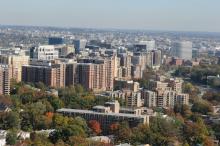Arlington, Virginia, Delivers Digital Inclusion
People living at the Arlington Mill Residences in Arlington, Virginia, are on track to obtain no-cost high-quality connectivity this fall, likely through the ConnectArlington network. The initiative is an example of how one local community plans to use its publicly owned Internet infrastructure to reduce the digital divide on its home turf.
The Homework Gap
Within Arlington Mill’s 122 affordable units, live 159 children; approximately half of the residences do not subscribe to an Internet access service. Because homework is increasingly dependent on a child’s ability to work online, kids at Arlington Mills must contend with the problem of finding access to computers and the Internet. For households that do subscribe, no-cost Internet access would free up monthly resources from $50 - $75 per month.
The Department of Technology Services (DTS) and Department of Community Planning, Housing, and Development (CPHD) are collaborating to support the Arlington Digital Inclusion initiative. The initiative will start in Arlington Mills by providing free Wi-Fi to each unit and will eventually move to other properties owned by the Arlington Partnership for Affordable Housing (APAH). As the program moves forward, the city plans to seek out private donations and other grants to reduce the digital divide. The program will also be exploring ways to help residents obtain reduced cost or free devices or computers to take advantage of the high-quality connectivity. APAH has already applied for a 2019 Community Development Fund grant to cover the cost of training and notebook computers for residents.
APAH expects to choose an ISP that will use ConnectArlington, the county's dark fiber network infrastructure.
The network began offering dark fiber services to business customers in 2015, but the infrastructure has been in place since 2012. Arlington took advantage of several infrastructure projects, including traffic control upgrades and other public safety improvements, to expand its fiber footprint. In 2014, Christopher spoke with Jack Belcher, who shared ConnectArlington's backstory, for episode 97 of the Community Broadband Bits podcast.



